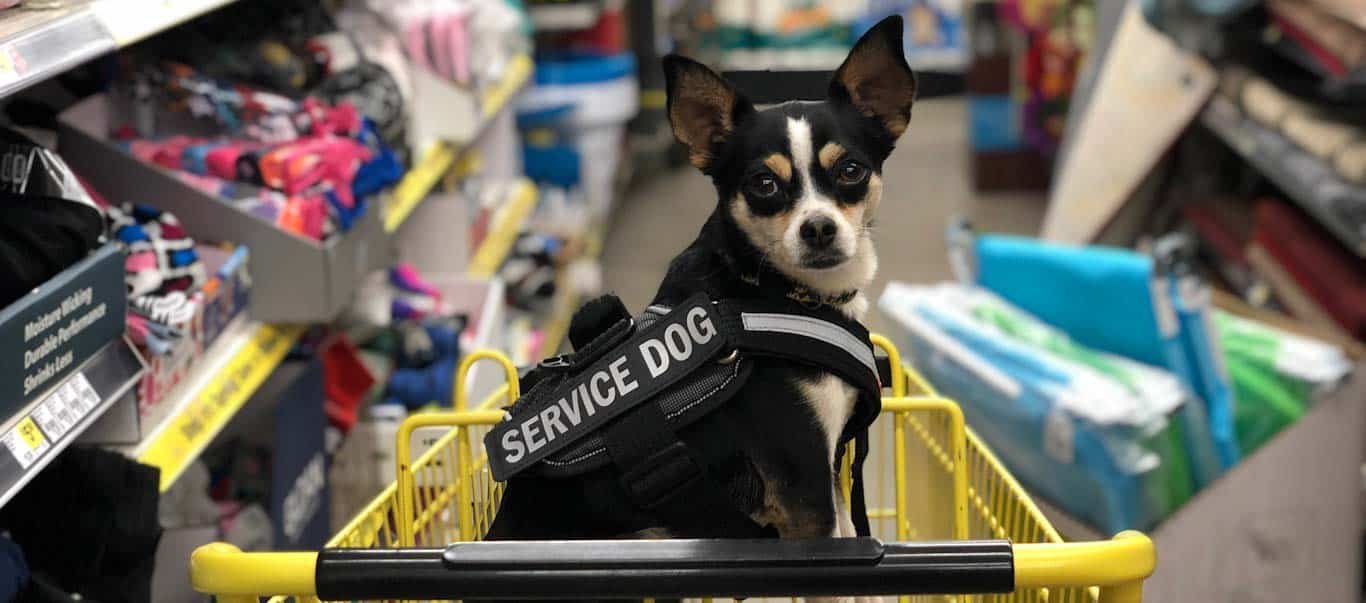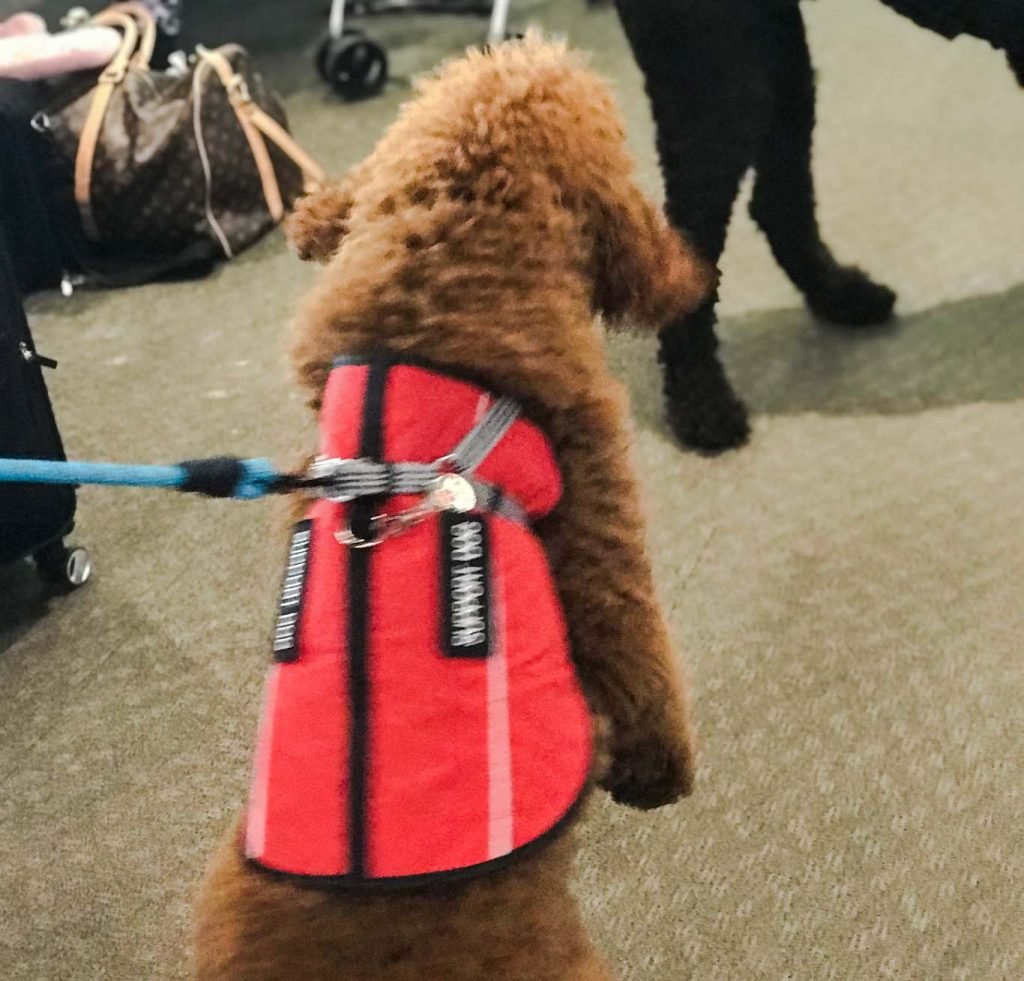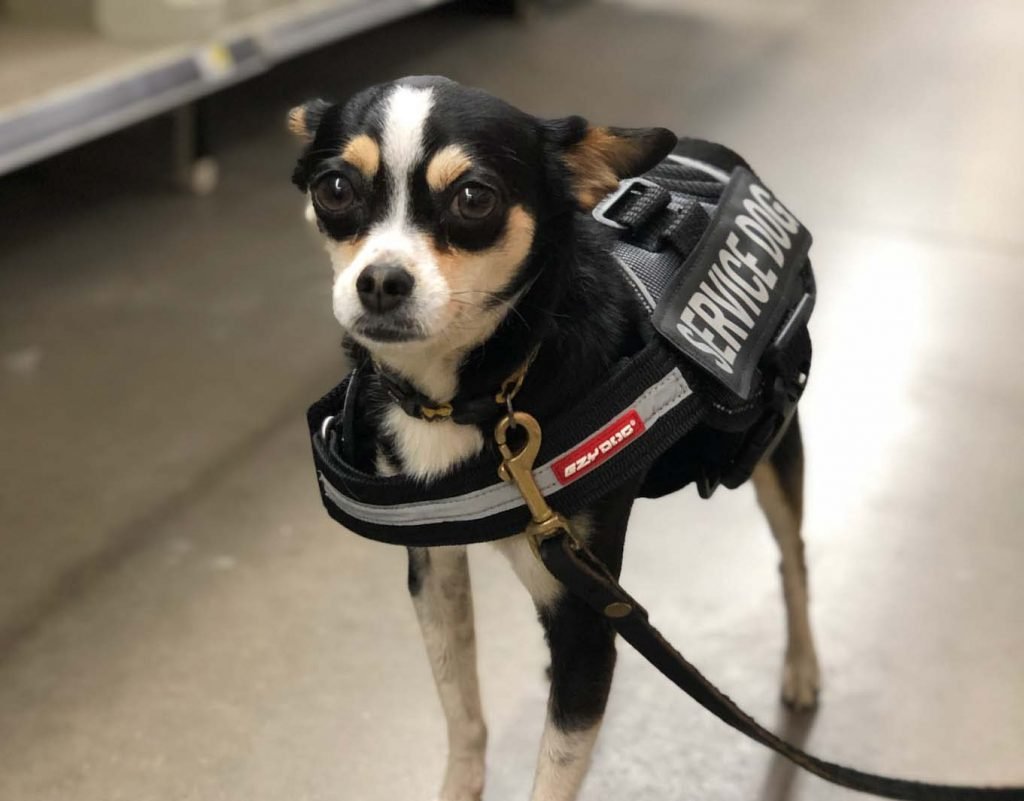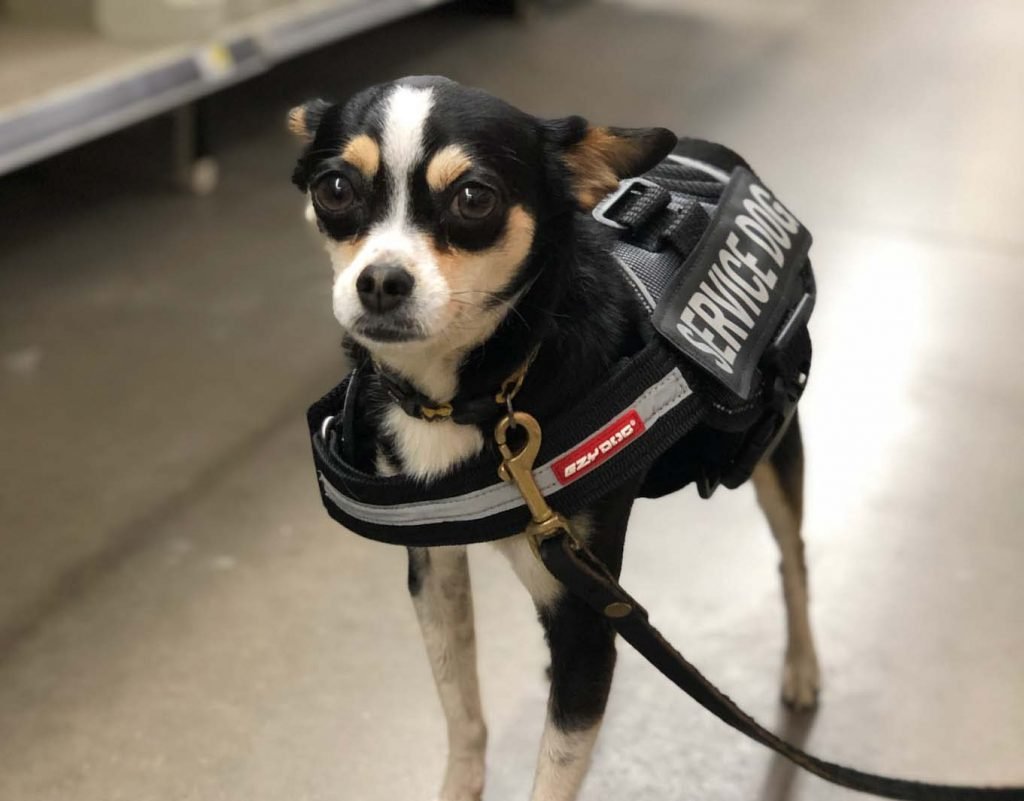Table of Contents
Whether it’s retrieving objects, guiding the blind, or providing companionship, service dogs play an invaluable role in the lives of individuals with disabilities. These highly-trained dogs are defined as any dog specifically taught to perform tasks that benefit a disabled person and are protected under the Americans with Disabilities Act. However, with the rise of fake service dogs, it has become crucial to differentiate between genuine service dogs and imposters. Genuine service dogs should exhibit focused and disciplined behavior, while fake ones may be easily distracted or aggressive. To combat this issue, Highland Canine Training offers top-notch service dog training programs to equip handlers with the skills and knowledge they need to navigate this challenging landscape.

Benefits of Service Dogs
Assistance with daily tasks
Service dogs provide invaluable assistance to individuals with disabilities by helping with daily tasks. They can be trained to retrieve dropped items, open doors, turn on lights, and perform other tasks that may be difficult or impossible for someone with a disability. This allows individuals to have greater independence and the ability to carry out daily activities with ease.
Increased independence and mobility
One of the greatest benefits of having a service dog is the increased independence and mobility it provides. For individuals with mobility impairments, service dogs can offer support and stability, helping them walk, climb stairs, and navigate obstacles. This allows them to go out in public places and participate in activities they may not have been able to do on their own.
Emotional support and companionship
Service dogs not only assist with physical tasks but also provide emotional support and companionship. Having a service dog by your side can help reduce feelings of loneliness, anxiety, and depression. They are trained to offer comfort and provide a sense of security, making them not just a valuable tool, but also a true companion.
Training and Certification
Definition of a service dog
A service dog is defined as any dog that is individually trained to perform tasks for the benefit of a disabled person. The tasks performed must be directly related to the person’s disability and must help mitigate the effects of their disability. These tasks can include physical tasks such as retrieving objects or guiding a person, as well as alerting to auditory signals or providing medical assistance.
The role of training in service dog preparation
Training plays a crucial role in preparing a service dog to perform the necessary tasks. It involves teaching the dog specific skills and behaviors that will allow them to assist their handler effectively. Training also focuses on building a strong bond between the dog and their handler, as trust and clear communication are essential for the successful functioning of a service dog team.
Certification options for service dogs
Contrary to popular belief, service dogs are not required to be licensed, certified, or trained by a specific agency. There is no official certification process for service dogs recognized by the ADA. However, some organizations offer voluntary certification programs to ensure that service dogs meet certain standards of training and behavior. While certification is not legally required, it can provide additional credibility and peace of mind for service dog handlers.
Legal Protection and Rights
The Americans with Disabilities Act (ADA)
The Americans with Disabilities Act (ADA) is a federal law that protects the rights of individuals with disabilities. Under the ADA, service dogs are considered to be working animals, not pets. They are granted certain privileges and protections to enable their handlers to fully participate in society. These protections include access to public places, transportation, and housing.
Rights and accommodations for service dog handlers
Service dog handlers are entitled to certain rights and accommodations under the ADA. They have the right to be accompanied by their service dogs in all areas open to the public, including restaurants, stores, and public transportation. They are not required to provide documentation or disclose details about their disability. Additionally, service dog handlers are allowed to fly with their service dogs in the cabin of an aircraft without any additional fees.
The consequences of misrepresenting a pet as a service dog
Misrepresenting a pet as a service dog can have serious consequences. Not only does it undermine the legitimacy of service dogs and their handlers, but it also undermines the rights and protections provided by the ADA. Misrepresentation can lead to public distrust, and it may result in businesses and establishments becoming suspicious or skeptical of legitimate service dogs. In some states, misrepresenting a pet as a service dog is a punishable offense that can result in fines or penalties.
Types of Service Dogs
Guide dogs for the blind
Guide dogs, also known as seeing eye dogs, are a type of service dog specifically trained to assist individuals who are blind or visually impaired. These dogs are trained to navigate obstacles, avoid hazards, and help their handlers move safely and independently. They play a vital role in enhancing the mobility and freedom of individuals with visual impairments.
Hearing dogs for the deaf or hard of hearing
Hearing dogs, also known as signal dogs, are trained to assist individuals who are deaf or hard of hearing. They are trained to alert their handlers to important sounds such as doorbells, smoke alarms, or ringing telephones. By providing these auditory alerts, hearing dogs enable their handlers to be aware of their surroundings and respond to important events.
Mobility assistance dogs
Mobility assistance dogs are trained to assist individuals with mobility impairments. These dogs are trained to provide physical support and balance to their handlers, helping them with tasks such as walking, standing up, or climbing stairs. They can also help retrieve items, open doors, and perform other tasks that require physical strength and dexterity.

Tasks Performed by Service Dogs
Retrieving objects
Service dogs can be trained to retrieve objects for their handlers, making life much easier for individuals with mobility limitations. They can pick up dropped items, fetch specific objects, and deliver needed items to their handler, reducing the need for the handler to bend down or reach for things.
Assisting with mobility and balance
One of the primary tasks performed by service dogs is providing mobility assistance and balance support to their handlers. They can be trained to walk alongside their handler and support them as they walk. This is particularly helpful for individuals with mobility impairments or those who use mobility aids such as canes or walkers.
Alerting to auditory signals
Hearing dogs are specifically trained to alert their handlers to important sounds, such as alarms, doorbells, or sirens. When they hear these sounds, they will make physical contact with their handler or use other trained signals to indicate the presence of the sound. This allows their handler to respond to these auditory signals and stay aware of their surroundings.
Providing medical assistance
In some cases, service dogs can be trained to provide specific medical assistance to their handlers. For example, they can be trained to detect changes in blood sugar levels for individuals with diabetes, alerting their handler to take necessary action. They can also be trained to detect and respond to seizures, providing comfort and assistance during and after an episode.
Behavioral Requirements for Service Dogs
Focused and disciplined behavior
Service dogs must exhibit focused and disciplined behavior at all times. They need to remain attentive to their handler’s needs and commands, even in distracting or stressful environments. This level of focus ensures that they can perform their tasks effectively and provide the necessary assistance to their handler.
Ability to handle distractions
Service dogs should be able to handle distractions without losing focus or becoming anxious. They should be able to remain calm and composed in various environments, including crowded public places, loud noises, or unfamiliar settings. This is important to ensure that they can assist their handler in any situation and that they do not pose a risk to others.
Non-aggressive behavior
Service dogs must display non-aggressive behavior towards people and other animals. They should be well-socialized and trained to interact politely with others. Aggressive behavior from a service dog not only jeopardizes the safety of the handler and those around them but also undermines the credibility of service dogs as a whole.

Challenges and Concerns
Fake service dogs
The issue of fake service dogs is a growing concern. Some individuals falsely claim that their pet dogs are service dogs in order to gain access to privileges reserved for legitimate service dog handlers. This not only undermines the rights of individuals with disabilities but also creates problems for businesses and establishments trying to uphold the law.
The rise of scam service dog companies
Another concern in the service dog community is the rise of scam service dog companies. These companies often sell poorly trained dogs to individuals in need of a service dog, taking advantage of their desperation and lack of knowledge. This can result in individuals receiving dogs that are ill-suited for service work or are poorly trained, posing a risk to both the handler and the public.
Ensuring legitimacy in service dog privileges
Differentiating between a real service dog and a fake one is crucial to ensure the legitimacy of service dog privileges. It is essential to educate the public and businesses about the rights and responsibilities of service dogs and their handlers. Strict enforcement of laws and penalties for misrepresentation can also help deter people from falsely claiming their pet dogs as service dogs.
Highland Canine Training’s Service Dog Programs
Overview of Highland Canine Training
Highland Canine Training is a renowned organization that offers quality service dog training programs. With their experience and expertise in dog training, they have developed programs specifically tailored to the needs of service dog handlers. They are committed to providing reliable and highly skilled service dogs that meet the individual needs of their clients.
Tailored training for service dog handlers
Highland Canine Training understands that every service dog handler is unique, with specific needs and requirements. Their training programs are designed to address these individual needs, ensuring that each dog is trained to perform tasks that directly assist their handler. They focus on fostering a strong bond between the dog and handler, as this is crucial for effective communication and teamwork.
Training methods and success stories
Highland Canine Training utilizes positive reinforcement-based training methods. This means that they reward desired behaviors and use positive reinforcement techniques to encourage learning and compliance. By using these scientifically proven methods, they create a positive learning environment for the dogs and promote their success in becoming capable service dogs. Many individuals have experienced transformative results through the training programs offered by Highland Canine Training.

Choosing the Right Service Dog
Assessing individual needs
When choosing a service dog, it is important to assess your individual needs and the specific tasks you require assistance with. Whether you need a guide dog, a hearing dog, or a mobility assistance dog, understanding your needs and limitations will help you determine the right type of service dog for you.
Matching the dog’s abilities to the handler’s needs
It is essential to match the abilities of the dog to the specific needs of the handler. Different breeds and individual dogs have different strengths and temperaments, so finding a dog that is well-suited to the tasks you need assistance with is crucial. Working with a reputable service dog training organization, such as Highland Canine Training, can help ensure that the dog you choose is the right fit for you.
Considering breed and temperament
When choosing a service dog, considering the breed and temperament is important. Some breeds are naturally more inclined to perform certain tasks, while others may have characteristics that make them ill-suited for service work. Consulting with professionals and trainers can help guide you in selecting a breed and individual dog with the right temperament and qualities needed for service work.
Costs and Financial Assistance
Budgeting for a service dog
Getting a service dog involves costs that need to be considered and budgeted for. The cost of purchasing or adopting a dog, along with the expenses related to their training, veterinary care, food, and supplies can add up. It is important to carefully plan and budget for these costs to ensure that you can provide the necessary care and support for your service dog.
Sources of financial assistance
There are various sources of financial assistance available to help offset the costs of obtaining a service dog. Many non-profit organizations and charities offer grants or fundraising assistance to individuals in need. Additionally, some health insurance plans or assistance programs may provide coverage for certain aspects of service dog ownership. Exploring these options can help make owning a service dog more affordable.
Insurance coverage for service dogs
While not all insurance plans provide coverage for service dogs, some do offer specific policies or coverage options for service dogs. These policies can help cover veterinary expenses, liability issues, or other costs associated with owning a service dog. It is important to consult with insurance providers to understand what coverage options are available and how they can benefit you as a service dog handler.
In conclusion, service dogs provide invaluable assistance to individuals living with disabilities, assisting with daily tasks, increasing independence and mobility, and providing emotional support and companionship. They are not required to be licensed or certified, but training plays a crucial role in their preparation. The ADA protects the rights of service dog handlers, but fake service dogs and scam service dog companies pose challenges and concerns. Highland Canine Training offers tailored training programs to address these challenges. When choosing a service dog, assessing individual needs, matching the dog’s abilities, and considering breed and temperament are important factors. Budgeting for the costs of owning a service dog and exploring sources of financial assistance and insurance coverage can help make it more accessible. Service dogs are truly remarkable animals, making a significant impact on the lives of their handlers and embodying the true essence of companionship and support.




